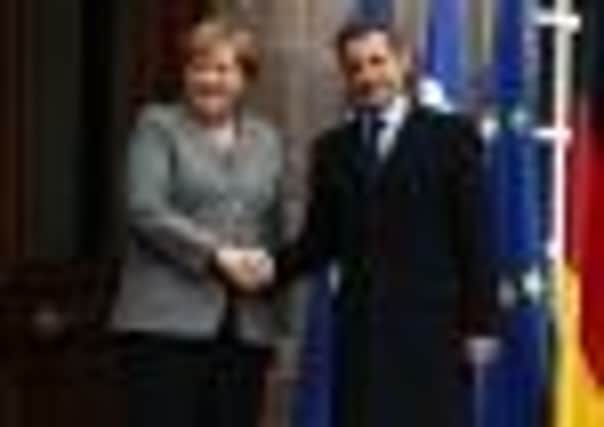Pressure grows for a referendum on Europe


The calls by Tory back-bench eurosceptics came as French president Nicolas Sarkozy and German chancellor Angela Merkel said they would be proposing changes to the treaties affecting the eurozone as it continues to come under pressure from the markets.
The two spoke after meeting Mario Monti, the new prime minister of Italy, the eurozone’s third biggest economy, in Strasbourg for the first time since he replaced Silvio Berlusconi.
Advertisement
Hide AdAdvertisement
Hide AdAfterwards, Mr Sarkozy said that the three are committed to saving the euro.
France had been reluctant to make any changes to eurozone governance via treaty changes, something Germany had supported. But Mr Sarkozy said that France and Germany would present “propositions for the modification of treaties” in the coming days.
He appeared to temper his calls for the European Central Bank to play a bigger role in solving Europe’s debt crisis.
He would not give details on what the treaty changes might be, but said they would be ready in time for the next EU leaders summit on 9 December.
Mrs Merkel insisted that the proposed changes would “not deal with the European Central Bank”, which she stressed was responsible for monetary, not fiscal, policy.
Mr Monti, meanwhile, reiterated his pledge to balance Italy’s budget by 2013 though he sidestepped the question on whether achieving that aim would require more austerity measures.
But according to eurosceptics, changes to the treaty should trigger the new referendum lock recently put into UK law by the coalition for handing over more powers to the EU, even though the UK is not in the eurozone.
Leading Tory sceptic John Redwood told The Scotsman: “Obviously the government will argue that because we are not in the eurozone this will not mean we have to use the referendum lock. But I would argue that if there is much closer political and fiscal union in the eurozone then that will fundamentally change the UK’s relationship with the rest of the EU.
Advertisement
Hide AdAdvertisement
Hide Ad“In that case we should look at the terms of our continuing membership and there should be a referendum.”
The comments reflect growing unrest on the Tory back-benches about the UK’s EU membership with the government last month only surviving a major rebellion on holding a referendum on Britain’s place in the EU courtesy of Labour votes.
The new political problems for Mr Cameron arose as the European Commission was forced to deny claims that Brussels had issued an ultimatum to him over his attitude towards the EU.
Commission president, Jose Manuel Barroso, held talks with the Prime Minister in Brussels last week and, according to reports, made clear his frustration over what is seen as a British bid to play EU powerbroker from outside the eurozone.
Mr Cameron is accused of wanting the best of both worlds – no responsibility for eurozone bail-outs and exemptions from EU financial rules which might harm the City of London.
In a statement issued in Brussels, a spokesman said: “President Barroso has repeatedly called for strong financial centres in Europe, including in the City of London.
“President Barroso did not say to Prime Minister Cameron that he must choose between protecting the City of London and influence in the European Union.”
Mr Cameron’s official spokesman said: “There is a planned European Council discussion coming up on 8 and 9 December that will look at the issue of new governance arrangements for the eurozone.
Advertisement
Hide AdAdvertisement
Hide Ad“One of the options being considered is limited treaty change and we have no doubt that many countries will come forward with proposals and views. There will be a paper from (council president) Herman van Rompuy and it sounds as if there will be proposals from the French and Germans.”
He added: “The European Council will be a first discussion on those governance arrangements and the proposals and then there will be further discussion in the coming months.
“Primarily, what is being looked at are the rules for the eurozone – how does the eurozone organise itself, how does it organise fiscal policy in particular, given what has happened in the past with the Security and Growth Pact.
“We are keen to ensure that those discussions don’t result in anything which would undermine the single market.
“We will think very carefully about how we approach the negotiation and look at opportunities for furthering our national interest in any negotiation that takes place.”